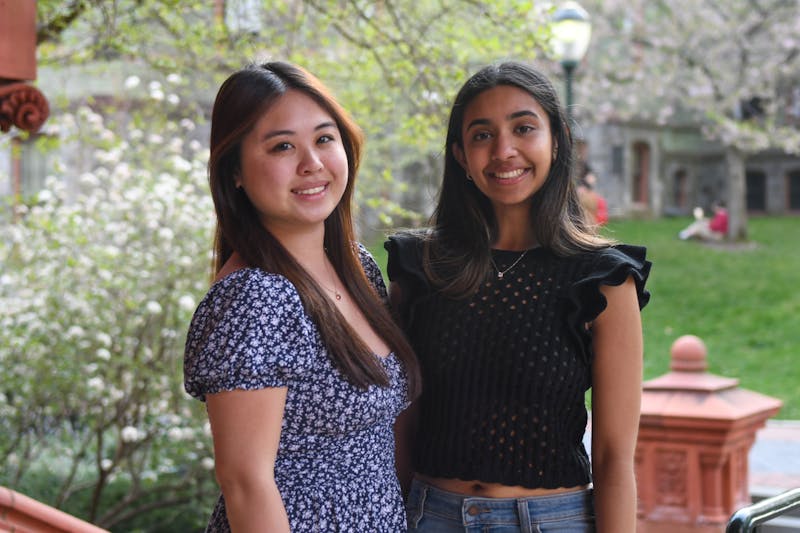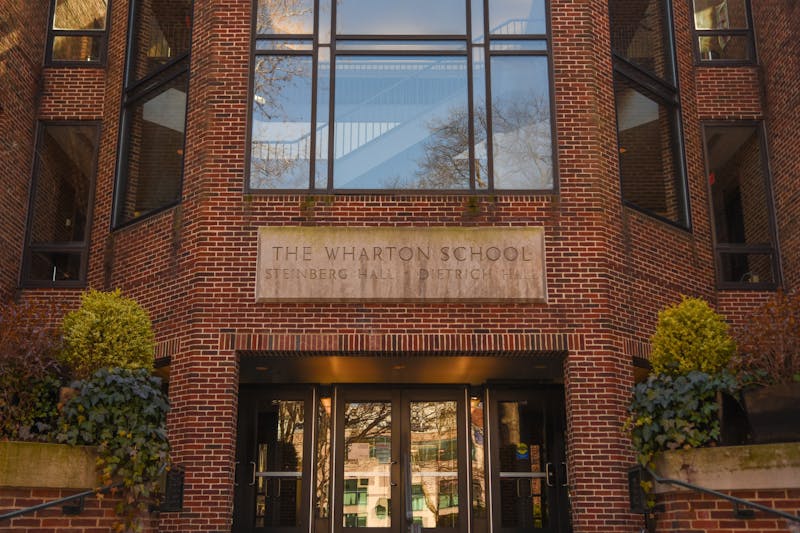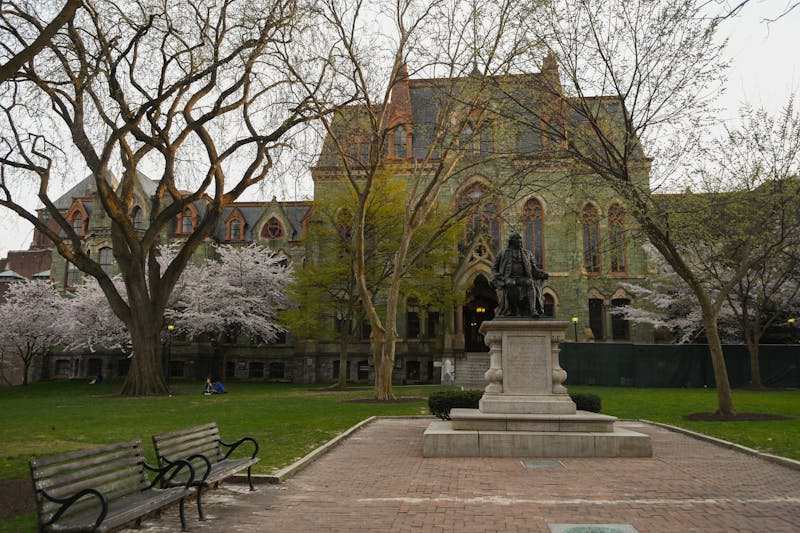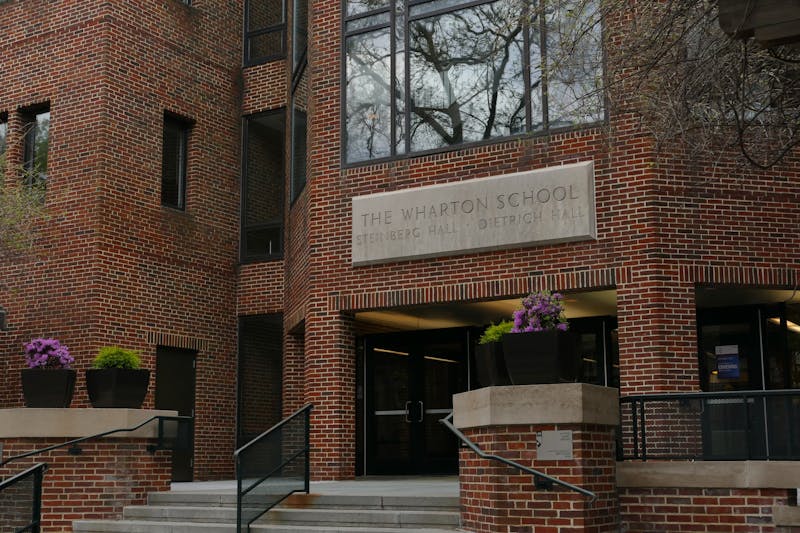
The Undergraduate Assembly held its presidential and vice presidential debates on April 3 and April 7 in the McNeil Building.
During the debates, the two presidential candidates — College junior Ria Ellendula and College junior Hannah Liu — discussed engaging University administrators and working with other UA members. The vice presidential candidates — Wharton sophomore Michelle Chen, who is campaigning alongside Ellendula, and College junior Mackenzie Sleeman, who is campaigning alongside Liu — discussed collaborating with students and administration members to increase productivity.
The presidential and vice presidential candidates touted their experiences and goals in their opening statements of the first debate.
Liu discussed her past projects as part of the UA, including establishing an excused absence policy for student athletes, expanding the airport shuttle program, and implementing a community service bylaw. She also said that, as president, she planned to work on preserving academic rights, supporting student athletes, and making first-year students’ transition to Penn easier.
Ellendula, who is also a former staffer for The Daily Pennsylvanian, said that she hopes to serve as UA president due to the sense of fulfillment gained from her years in the UA. She spoke about her love of advocacy, adding that her platform — which she described as structured around diversity and equity, academic initiatives, equity and inclusion, and wellness — aims to bring “high impact solutions” to students.
Sleeman cited his experience as a transfer student from Villanova University and his experience as New Transfer representative and College representative. He specifically said that he spearheaded Penn's transfer student writing seminar and the XCAT working group.
Chen spoke about her background, as she comes from a rural town in North Carolina. She specifically touted an initiative she led with Wellness at Penn to bring a vending machine that would dispense over-the-counter medications to campus, which is expected to arrive over the summer or in the fall.
During the debates, Liu and Ellendula discussed their plans to engage university administrators and work alongside other UA members to ensure transparency.
Liu said that she would formulate agendas for meetings with administrators based on meetings with student constituents, making sure that all relevant information is relayed to the University administration.
Ellendula discussed her plan to use survey responses to demonstrate to administration that initiatives have student support. She also spoke about her experience on the Committee on Voting Expression, emphasizing her commitment to ensuring that students’ speech is protected.
During the second debate, both candidates were given an opportunity to discuss their individual campaign platforms, and reiterated many of their points from the first debate. Liu’s “Penn to Paper” and Ellendula’s “An Intentional Penn” campaigns both emphasize increasing access to mental health resources and creating real change that is meaningful for all students.
In the Q&A portion of the debates, both candidates discussed the issue of the transparency between the UA and the general student body, acknowledging that current communication is insufficient.
“The goal of ‘Intentional Penn’ is to restructure the UA on both an inward-facing and an outward-facing level as a way to bridge the transparency gap,” Ellendula said.
Ellendula focused her arguments on implementing structural changes to the UA and leading specific initiatives, such as an on-campus thrift store, that would allow the UA to become more present on campus.
Liu similarly stressed the importance of transparency, saying that, under her presidency “the UA will reach out to students, not the other way around.” She said that she is hoping to send out diversity, equity, and inclusion surveys to students, which will allow the UA to better gauge student concerns so that she and her team members can work with the appropriate administrators to reflect and improve.
Both candidates also heavily debated funding during the Q&A session.
Liu discussed how cultural groups are the best way through which DEI-related goals can be achieved, emphasizing the importance of funds being distributed to these groups. She also contended that groups have expressed they do not have a good understanding of how the University’s funding process works, and suggested providing a financial adviser to such groups to ensure that these concerns are addressed.
“We need to create sustainable funds for cultural groups,” she said.
Ellendula said that she “wants to understand what student group needs are and how they can be met without funding alone.” She emphasized efficiently allocating funds while still balancing club needs.
Both candidates expressed desire to follow through with their initiatives even if they are not elected as UA president.
During the vice presidential debate, Sleeman and Chen discussed how the UA could better engage with students to make them aware of the UA’s work, how they have worked with administration to address student concerns, and how they plan to make the UA collaborative and productive.
Sleeman said that much of student advocacy work may not reflect student needs, emphasizing the importance of effective communication about concerns, advocacy work, and development by educating the student body.
In response, Chen said that Penn Student Government week and pop-up information sessions could be an effective solution in ensuring that the UA acts as “a microphone that is turned into a megaphone for students to talk about the concerns that they have.” She also emphasized using school-wide emails and other existing communication methods to reach the student body.
Both candidates also discussed their past initiatives. Sleeman cited raising transfer students’ concerns to the Dean’s Advisory Board and the Dean, resulting in the creation of the XCAT working group, and Chen mentioned how she had begun work on an initiative to provide summer storage for first-generation, low-income students. She also discussed how she had raised students’ concerns with Provost John Jackson.
Both Sleeman and Chen emphasized the value of collaboration across groups to ensure that students’ needs are met.
Unlike last year, this year's debates included a joint Q&A session in which alternating pairs of running mates answered questions for two minutes each while their opponents stepped outside the room.
Voting for UA roles is currently open and will close on Tuesday, April 9 at 11:59 p.m. Students are able to vote online through the Penn Student Government website.
The Daily Pennsylvanian is an independent, student-run newspaper. Please consider making a donation to support the coverage that shapes the University. Your generosity ensures a future of strong journalism at Penn.
Donate










